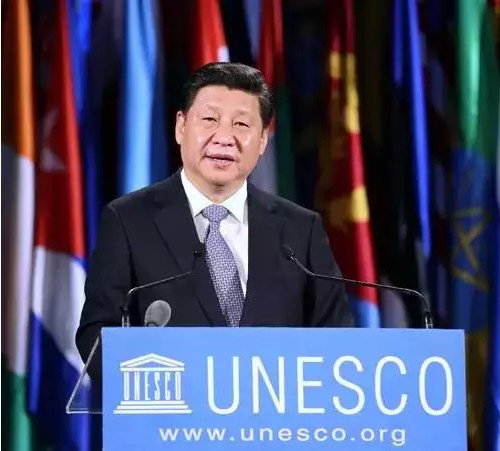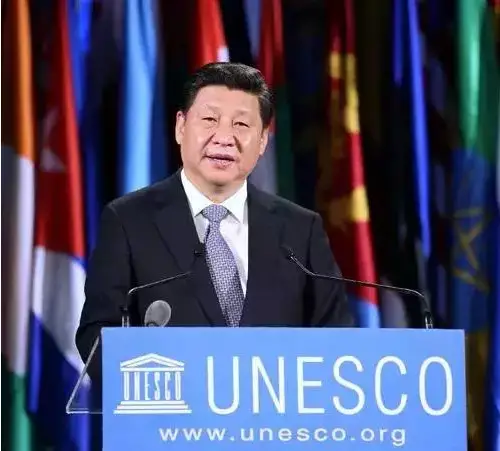Source: People's Daily

The concept of “building a community of common destiny for mankind,” proposed by Chinese President Xi Jinping at the UN summit in 2015, is a solution China is offering to the world in light of interlinked global destiny, the People’s Daily said in a commentary published on Sunday.
The article comes ahead of Xi’s visit to Switzerland, during which he will be elaborating on his concept at a speech at the UN Office at Geneva.
In the article, “The concept of a community of common destiny for mankind illuminates future,” the People’s Daily discussed the origin, implications, development and significance of the concept.
The concept of “community of common destiny,” which is rooted in China’s traditional culture, also forms the foundation of China’s diplomatic philosophy, the commentary said.
In today’s world where the interests and destiny of each country are intertwined, China, by proposing to build a new type of international relations based on win-win cooperation and to create a community of common destiny for mankind, presents the globe a prescription with oriental wisdom after it analyzed the pulse of times and historic trajectory, the paper explained.
Xi has expounded on the concept on several domestic and international occasions since 2012, hoping to influence the world on China’s views on the future of human civilization.
China has reaped the harvests of building a community of shared destiny among its neighbors and in the region by seeking to maximize the common interests of all stakeholders through a gradual approach, the article emphasized.
The international community praised such accomplishments as a reflection of China’s strong sense of responsibility in helping the world through its own development, it added.
When he addressed the UN’s 70th anniversary in September 2015, Xi expounded on how to build a community of common destiny for mankind through his five-point proposal.
According to the article, building a partnership in which countries treat each other as equals, engage in consultations and show mutual understanding serves as the main pathway to realize the goal.
A security architecture involving and shared by nations based on fairness and justice serves as the key, while an open, innovative and inclusive development outlook that benefits all is a basic principle that must be followed.
What’s more, the increasing inter-civilization exchanges with a respect for differences will help tighten the community’s bond, while an ecosystem that puts nature and green development first will ensure a more sustained community.
The article said that it believes China’s efforts can enlighten the world when building a community of common destiny for mankind. It shows that China, by sharing its experiences on state governance with the rest of the world, has driven society’s progress with its own development.
Over the past 30-plus years since China launched its reform and opening-up policies, the country has grown into the world’s second largest economy and lifted more than 700 million people out of poverty, which took the developed world hundreds of years to accomplish.
Last year’s G20 Hangzhou Summit also generated more fruits, the paper added, saying that foreign media and scholars attributed all successes to China’s globalized vision while formulating development and reform policies.
China, at the same time, injects new impetus to the global governance principle of shared growth through discussion and collaboration by providing the world with constructive initiatives, the paper said, citing the “Belt and Road” initiative, APEC meeting and G20 Summit as examples.
More than 100 countries and international bodies have been involved in the “Belt and Road” initiative since it was put forward in 2013, the article explained, adding that about 30 countries have signed agreements with China to jointly build the initiative, and more than 20 countries along the routes have entered into industrial cooperation with China.
In addition, the Beijing-hosted APEC Economic Leaders' Meeting contributed to a more open, prosperous and integrated regional economy by playing a pioneering role in building the Free Trade Area of the Asia-Pacific and advancing negotiations on the Regional Comprehensive Economic Partnership.
China also contributed to the adoption of the landmark Global Trade Growth Strategy by the G20 Hangzhou Summit, reduction of trade costs as well as coordination on trade and investment policies.
As a series of Chinese solutions are now propelling the reform of the global governance system, China is shouldering its responsibility as a major country in global governance,” the paper concluded. (People’s Daily)
The article comes ahead of Xi’s visit to Switzerland, during which he will be elaborating on his concept at a speech at the UN Office at Geneva.
In the article, “The concept of a community of common destiny for mankind illuminates future,” the People’s Daily discussed the origin, implications, development and significance of the concept.
The concept of “community of common destiny,” which is rooted in China’s traditional culture, also forms the foundation of China’s diplomatic philosophy, the commentary said.
In today’s world where the interests and destiny of each country are intertwined, China, by proposing to build a new type of international relations based on win-win cooperation and to create a community of common destiny for mankind, presents the globe a prescription with oriental wisdom after it analyzed the pulse of times and historic trajectory, the paper explained.
Xi has expounded on the concept on several domestic and international occasions since 2012, hoping to influence the world on China’s views on the future of human civilization.
China has reaped the harvests of building a community of shared destiny among its neighbors and in the region by seeking to maximize the common interests of all stakeholders through a gradual approach, the article emphasized.
The international community praised such accomplishments as a reflection of China’s strong sense of responsibility in helping the world through its own development, it added.
When he addressed the UN’s 70th anniversary in September 2015, Xi expounded on how to build a community of common destiny for mankind through his five-point proposal.
According to the article, building a partnership in which countries treat each other as equals, engage in consultations and show mutual understanding serves as the main pathway to realize the goal.
A security architecture involving and shared by nations based on fairness and justice serves as the key, while an open, innovative and inclusive development outlook that benefits all is a basic principle that must be followed.
What’s more, the increasing inter-civilization exchanges with a respect for differences will help tighten the community’s bond, while an ecosystem that puts nature and green development first will ensure a more sustained community.
The article said that it believes China’s efforts can enlighten the world when building a community of common destiny for mankind. It shows that China, by sharing its experiences on state governance with the rest of the world, has driven society’s progress with its own development.
Over the past 30-plus years since China launched its reform and opening-up policies, the country has grown into the world’s second largest economy and lifted more than 700 million people out of poverty, which took the developed world hundreds of years to accomplish.
Last year’s G20 Hangzhou Summit also generated more fruits, the paper added, saying that foreign media and scholars attributed all successes to China’s globalized vision while formulating development and reform policies.
China, at the same time, injects new impetus to the global governance principle of shared growth through discussion and collaboration by providing the world with constructive initiatives, the paper said, citing the “Belt and Road” initiative, APEC meeting and G20 Summit as examples.
More than 100 countries and international bodies have been involved in the “Belt and Road” initiative since it was put forward in 2013, the article explained, adding that about 30 countries have signed agreements with China to jointly build the initiative, and more than 20 countries along the routes have entered into industrial cooperation with China.
In addition, the Beijing-hosted APEC Economic Leaders' Meeting contributed to a more open, prosperous and integrated regional economy by playing a pioneering role in building the Free Trade Area of the Asia-Pacific and advancing negotiations on the Regional Comprehensive Economic Partnership.
China also contributed to the adoption of the landmark Global Trade Growth Strategy by the G20 Hangzhou Summit, reduction of trade costs as well as coordination on trade and investment policies.
As a series of Chinese solutions are now propelling the reform of the global governance system, China is shouldering its responsibility as a major country in global governance,” the paper concluded. (People’s Daily)
 Menu
Menu
 Xi’s ‘common destiny’ for mankind enlightens world: People’s Daily
Xi’s ‘common destiny’ for mankind enlightens world: People’s Daily
















